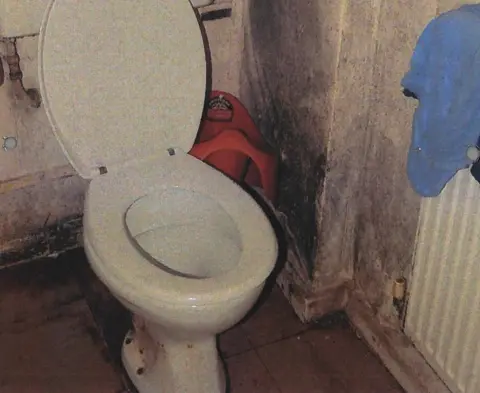Awaab Ishak: Widespread failings at mould death housing group
 Family handout
Family handoutA government regulator has found "widespread failings" at the housing association that rented out a mouldy flat to the family of Awaab Ishak.
The two-year-old died from a respiratory condition caused by exposure to the mould, a coroner ruled.
The Regulator of Social Housing (RSH) said Rochdale Boroughwide Housing (RBH) had failed to "treat Awaab Ishak's family with fairness and respect".
RBH said it was addressing "failings" and making changes to its board.
The housing association said there were "hard lessons to learn" and it was working with the regulator to make necessary improvements.
Awaab's family had repeatedly complained about mould in their flat but no action was taken before his death in 2020.
In November, the family accused the housing provider of being "racist" and failing to provide fair treatment to people moving to the UK.
RSH - the government body which monitors social housing providers in England - said it had found "significant failings in the way RBH deals with damp and mould across the organisation".
It downgraded the provider to the second-lowest grading on a four point scale, meaning it had breached standards and was required to take action.
 Greater Manchester Police
Greater Manchester PoliceThe regulator found the housing group had waited nearly two years after Awaab's death to check for damp and mould in other homes on the estate.
When that eventually happened, they found hundreds of tenants living with damp and mould.
RBH had "failed to act quickly and protect more tenants from potential harm", the regulator said.
Other findings included:
- RBH gave the regulator inadequate information shortly after Awaab Ishak's death
- Weaknesses in its IT and internal communications, which led to vital information and risks being missed
- Incorrect assumptions about the cause of the damp and mould
- The housing association failed to act to resolve the issues
RSH chief executive Fiona MacGregor said: "Our investigation reveals significant failures in the way RBH manages damp and mould in its homes, resulting in harm to tenants.
"The tragic death of Awaab Ishak should have led to action to establish wider risks, but RBH failed to respond quickly or effectively. This is unacceptable.
"RBH needs to address the issues we have found and we will take further action if it fails to do so."

Housing Secretary Michael Gove said RBH's failures "meant that Awaab Ishak needlessly and tragically lost his life".
He said he would continue to block government funding for RBH to build new homes until it could prove each of its residents has "a safe and secure home".
The minister added: "We must honour Awaab's memory, so I am looking at new measures - including legislation - that will go further to deliver urgent action when people complain about damp and mould and make sure the rights of tenants are respected."
RBH said it had already made changes to the membership of its board and recruitment for new members, including a new chair, would start in January.
It also added that staff were now speeding up the complaints system, using new translation tools and improving ventilation on the Freehold Estate where Awaab lived.
 Reuters
ReutersA spokesman said: "There are hard lessons to learn - process must never get in the way of people, tenant voice must always be valued, maintenance and property renewal should be prioritised, tenant safety must always be the first and foremost consideration."
The group previously apologised and said it had set up a specialist task force to deal with damp and mould.
Landlords nationally have been ordered to submit evidence to the RSH by Monday about how they deal with damp and mould, or face "appropriate action".
The latest English Housing Survey shows 3.4 million occupied dwellings failed to meet the Decent Homes Standard and 4% of the occupied dwelling stock had problems with damp in 2021.

Why not follow BBC North West on Facebook, Twitter and Instagram? You can also send story ideas to [email protected]
